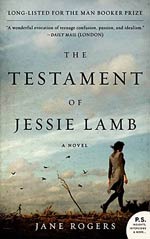
![]() dh65
dh65
6/18/2013
![]()
The Testament of Jessie Lamb is a first-person account of a 16-year-old English girl's search for a way to find meaning in life in the face of the possible extinction of homo sapiens within a single generation. Her struggles put her in a violent power struggle with her parents, who cannot understand or accept her independent choice to sacrifice her life in an effort to save humanity from extinction.
In the near future, an act of bioterrorism has infected the entire world population with Maternal Death Syndrome, which kills women shortly after they become pregnant. MDS is fatal 100% of the time and appears to preclude further human reproduction.
Most adolescents of Jessie's age struggle to find the meaning of their lives, often arriving at answers that their parents cannot accept. Jessie's struggle is made all the more difficult and pressing by the impending end of the human race.
[*spoilers follow*] Researchers are able to produce a vaccine against MDS but there is nobody to vaccinate; everyone is infected. Scientists begin experimenting with impregnating teenagers with frozen embryos that predate MDS and that can be vaccinated in utero, in the hopes of producing a generation of MDS-free babies that may give humanity a chance at survival. The surrogate mothers will not survive their pregnancies but can be kept in a vegetative state, as "sleeping beauties," until the babies can be delivered.
I'm really surprised by the negative reviews of this book by a couple of other readers and WWEnd members. They seem to find Jessie insufferably self-centered. They see Jessie's decision to volunteer for the sleeping-beauty experiment as a suicidal act. I think that is wrong.
Jessie feels utterly powerless in the face of MDS and the oncoming end of the human race. In volunteering to be a sleeping beauty, Jessie sees an opportunity to wrest agency from powerlessness. It's an unusual kind of agency but it's real for her. It is a chance to do something other than surrendering.
Jessie's parents see her choice as naive and futile. It may be both. But it is also a choice to act rather than to give up. She can't understand her parents' inability to grasp the legitimacy and profundity of the existential crisis that MDS has created for her and her generation, and their inability to see her choice in the context of that crisis. It surprises me that other reviewers seem, like Jessie's parents, unable to put themselves in her place and to see things from her perspective.
The Testament of Jessie Lamb does not attempt to resolve the many psychological, ethical, moral, and political questions it explores. But it presents those issues in a thoughtful and, I found, compelling way.